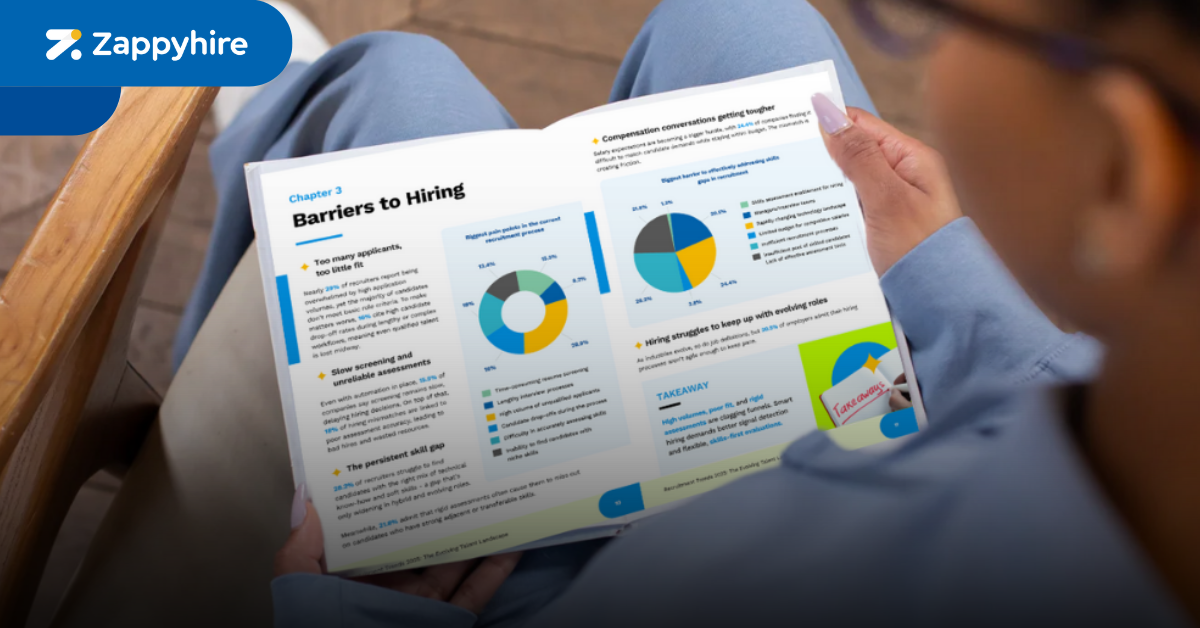
Let’s consider this scenario, shall we? A recruiter logs in on Monday morning, but instead of drowning in resumés, they’re already shortlisting top candidates – scored, ranked, and insight-ready.
Interviews are scheduled. Biases are curbed. Decisions are smarter, faster, and more aligned with the job. Sounds like science fiction?
It’s not. It’s how recruitment is currently.
And at the heart of this shift? AI in recruitment, powering intelligent shortlisting, real-time screening, and smarter decision-making from day one.
As Jyothis KS, co-founder of Zappyhire, the recruitment automation platform put it, “We’ve identified around 16+ recruitment use cases where automation can be an enabler, not a decision-maker.”
We’re witnessing the evolution of traditional hiring – quietly, steadily, and with the kind of technological finesse that doesn’t just digitize processes but transforms them.

The limits of traditional hiring
Traditional methods, like structured interviews and resume evaluations, have long been the backbone of hiring. Yet, as roles evolve rapidly, these methods are falling short making a compelling case for integrating AI in recruitment..
- Over half of companies (60%) still lean heavily on intuition-based screening, but this approach often misses critical insights into a candidate’s future potential.
- Similarly, despite widespread usage (53%), traditional interviews alone are increasingly inadequate in capturing adaptability and predicting job success.
High volumes, low relevance
Recruiters today face a paradox – application volumes are higher than ever, but suitable candidates remain elusive.
- Nearly three in ten recruiters (29%) find themselves swamped by irrelevant profiles, creating bottlenecks that hinder effective screening.
- Complicating matters further, rigid and lengthy recruitment processes lead about 16% of qualified candidates to drop out prematurely, frustrated by inefficiency and complexity.
Slow screening, weak results
Even organizations embracing automation face challenges.
- Around 15.5% admit their screening processes remain slow, causing crucial delays.
- Moreover, poor assessment accuracy continues to plague 18% of companies, resulting in hiring mismatches, wasted resources, and higher turnover rates.
Clearly, not all automation delivers equally.
Closing the skills gap
The skills gap isn’t narrowing – it’s widening.
- Recruiters increasingly struggle (28.2%) to identify candidates who blend essential technical abilities with crucial soft skills like adaptability and emotional intelligence.
- Rigid assessment models exacerbate this issue, causing 21.8% of recruiters to overlook exceptional talent simply because their skills aren’t presented traditionally.

Navigating integration challenges
While excitement around AI in recruitment is palpable, its integration isn’t seamless.
- Nearly 28.2% of organizations report delays and complications when aligning AI tools with legacy systems or existing workflows.
Without effective integration, even powerful AI solutions can’t deliver their maximum value, highlighting the necessity of thoughtful implementation strategies.
The true ROI of AI
AI in recruitment isn’t just about speed – it’s about strategic advantage.
- Around 81% of companies implementing recruitment automation successfully see substantial improvements in hiring efficiency.
- More impressively, nearly 55% reduce their cost-per-hire and boost their candidate-job match accuracy.
AI moves beyond mere efficiency, enabling recruiters to build stronger, more cohesive teams and fostering a fairer, more inclusive hiring process.
Balancing automation with human connection
Automation often sparks fears about losing empathy in the recruitment process, a concern shared by 55.3% of recruiters.
But those effectively leveraging AI in recruitment find quite the opposite – automation provides recruiters more bandwidth for meaningful interactions.
Instead of gatekeeping, recruiters become strategic advisors, guiding candidates through a personalized, empathetic hiring journey.
Predictive, human, and purpose-driven hiring is on the rise
By this time next year, 64% of companies plan to scale their AI usage in hiring. Not because it’s trendy, but because it works.
And as roles evolve, the spotlight will shift to soft skills: adaptability, clarity, collaboration. The kind of traits you can’t scrape from a resumé.
That’s why AI in recruitment, especially through contextual/behavioral assessments, and AI-driven interviews, is becoming essential to future-proof hiring.
Recruiters won’t just fill positions. They’ll shape workforces. Anticipate needs. Influence strategy.
Sound ambitious? It is. But the roadmap is already here.
Don’t just catch up. Get ahead.
This isn’t just about digitizing what’s broken. It’s about reimagining how hiring should work, from the ground up.
Curious about how the most forward-thinking companies are blending AI, empathy, and strategic foresight to build unstoppable teams?
The full report is where the real gold lies (in fact, this whole article was based off of it.)
Download it to see the exact trends, tactics, and tech shaping recruitment in the coming years – and how to make it work for your team.






